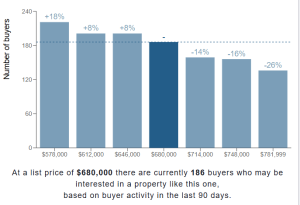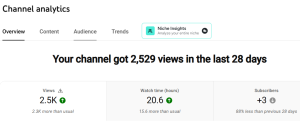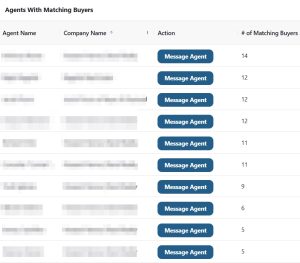Even in This Market Some Homes Expire Unsold
It's a common belief that every home listed in Westchester County and the Hudson Valley sell the first week they are on the market. Many do; some do not. Traditionally, industry practitioners will say that if a home does not sell that the list price is an issue and should be lowered. That often works. But our duties to our client should go beyond a race to the bottom.
In some cases, it's not the price alone, but the audience that the listing broker targets in their marketing. While some may dismiss this and assert that all listed homes are on a level playing field, with Zillow, search sites, and other typical conduits presenting the entire inventory, they miss the point. Not every potential buyer for a home is scrolling through online listings regularly. We have to go find them.
Online technology has changed, but all too few agents are educating themselves on how to best leverage the tools at their disposal.
 When I consult with a home owner who was unsuccessful in their first attempt to sell their home, I do a post-mortem of sorts on why the prior listing did not procure a buyer. I then run an analytics program to ascertain the projected performance of the listing in my own marketing ecosystem. That may sound like a lot of jargon, but with access to the right data, I can see how many registered home searches match up with the property's characteristics, like size, location, and price.
When I consult with a home owner who was unsuccessful in their first attempt to sell their home, I do a post-mortem of sorts on why the prior listing did not procure a buyer. I then run an analytics program to ascertain the projected performance of the listing in my own marketing ecosystem. That may sound like a lot of jargon, but with access to the right data, I can see how many registered home searches match up with the property's characteristics, like size, location, and price.
I also look at non data-driven things. Were the listing photos professionally done, or were they taken with a mobile phone? Was the property staged? Were there floor plans? Did the prior listing have any aerial drone imaging? Was there a virtual tour? And what online marketing was done not to just attract a potential buyer, but to actually go out and find them? Was special financing available that wasn't offered?
Often, the answers are not flattering to the prior listing agent. Putting a property on the MLS is important but not always enough. Yes; getting eyeballs on a home listed is our job as agents. Equally if not more important is making sure that when we do get their attention that what they see is compelling, attractive, and sparks their desire to dig deeper.
One of my secret weapons is my use of video. Few realize that the second most utilized search engine behind Google is YouTube. Today, more than ever and in growing numbers, prospective home buyers are researching communities before they search for property. It makes sense; why search a town or locale if it isn't an area that offers what they want in a place to live? Buyers research commuting to NYC, schools, taxes, parks and recreation, walkability, proximity to amenities, and dozens of other lifestyle- driven attributes. Often, they don't search for a home until months after they've collected the information and made a decision on their preferred destination.
My YouTube Channel has thousands of views monthly, and has been a game-changer for my listings. Community profiles, property vlogs, and local attractions give me a virtually unlimited amount of content to present, and I've learned to use key words, tags, and search engine optimization to grow the channel traffic.

My listings have high definition imaging, satisfying 3D virtual tours, floor plans, and a comprehensive online marketing suite that acts like an online bloodhound for my client's listing. It's not passively waiting for someone to find the listing as they scroll through other properties.
It is an active and aggressive strategy that targets the profile buyer by a powerful algorithm that takes into account income, predictive analytics (their online behavior indicates they might be a candidate for the property), and other profile traits, then puts your listing in their ad stream the same way that other retailers follow you around like Amazon, eBay, your favorite store or online merchant.
The predictive analytic part could be as varied as a first time home buyer researching credit repair or low down payments, all the way up to a Robb Report luxury consumer and their online exploration.
Real estate agents in 2025 have to be technologists in the same way that we have to understand pricing and staging.
It's not just having YouTube videos or quality photos.
It's understanding the target buyer market and how to find them.
It is understanding how online marketing campaigns are built.
It is using artificial intelligence for more than asking Chat GPT a question.
It is understanding how heat maps work and using them to target the most responsive regions.
It is understanding how to use data to determine the most efficacious strategy.

Reverse prospecting has existed for decades. I'd be shocked if I've ever heard the term used by a client once, because agents seldom use it. That's a shame, because it is one of the available tools that even a rotary phone using person could use to see around corners. Reverse prospecting tells me every agent who has a client in their MLS database who matches the listing criteria.
Of course, this isn't to say that non -digital marketing isn't on the menu. It certainly is. Old fashioned open houses have a renewed value to consumers of all types because they allow a perspective buyer to view a property without having to engage an agent. Some people aren't ready to hire a buyer agent yet, and that's understandable. I want them to meet me at my open house and buy one of my listings.
I understand the stress and frustration that even a successful listing can be for a homeowner. Having strangers walk through your home, open your closets, and wander about is intrusive. How you sell a home is not how you live in it. So if you're going to go through all that effort of tidying up, decluttering, and being out for hours on end you deserve to have a successful and financially advantageous sale.
Contact me today and find out what I can do to make that a reality.


